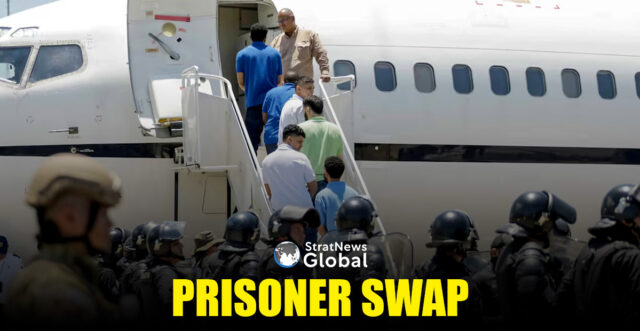In a significant repatriation move, more than 200 Venezuelans who were deported from the United States earlier this year over alleged gang affiliations and subsequently held in an El Salvador jail, returned to Caracas on Friday.
The release was part of a coordinated prisoner exchange, with 10 Americans held in Venezuela returned to the United States, officials from all three countries said.
In a post on X, El Salvador President Nayib Bukele said the Americans were en route to El Salvador from where they would continue “their journey home,” while US Secretary of State Marco Rubio confirmed the release of “ten Americans who were detained in Venezuela.” He thanked Bukele for his help in securing the agreement.
Maduro Celebrates Arrival
Venezuela’s government said 252 Venezuelans held in El Salvador had been freed. President Nicolas Maduro celebrated the arrival of two airplanes carrying them near Caracas on Friday evening.
The Venezuelans were sent to El Salvador from the United States in March after US President Donald Trump invoked the 1798 Alien Enemies Act to swiftly deport alleged members of the Tren de Aragua gang without going through normal immigration procedures. They were held in El Salvador’s notorious CECOT maximum security prison.
The deportations drew fierce criticism from human rights groups and a legal battle with the Trump administration over allegations that due process was not followed.
‘Can’t Believe It’
Family members of many of the Venezuelans and their lawyers deny they had gang ties, and say they were not given a chance to contest the Trump administration’s allegations in court.
“I can’t believe it,” said Angie Rios, the US citizen wife of Venezuelan CECOT detainee Jesus Rios after seeing Bukele’s X post about the release. “I have chills all over my body.”
Some family members of Venezuelan CECOT prisoners told Reuters they expected to greet their loved ones from a distance before the men are processed by Venezuelan authorities.
The government has said all the men will receive a full medical check and then be released to go home. It says only seven of them have a serious criminal record.
Political Prisoners
The shuttered US embassy in Caracas shared a photo on X of 10 men waving American flags alongside US Charge d’Affaires John McNamara, who is based in Bogota. A press representative said the photo was taken in Caracas. A later photo showed the men onboard a plane.
Senior US officials also said 80 domestic political prisoners in Venezuela would be freed, although the Venezuelan government referred only to “alternative” detention measures in its statement.
Former opposition governor and politician Williams Davila, arrested in August of last year, was released on Friday, said Venezuelan Interior Minister Diosdado Cabello, while an NGO for political prisoners published a list of 14 others they said had been released.
Separately, Venezuela hailed the return of seven migrant children who had been separated from their parents in the United States. The children were among another batch of Venezuelans who returned from the US on a regular deportation flight.
Venezuela’s government has always decried the detention of its citizens as a violation of human rights and international law. But the government’s critics say the country holds activists and opposition figures in similar conditions in Venezuela.
US Alien Enemies Act
The US Alien Enemies Act is best known for being used to intern and deport people of Japanese, German and Italian descent during World War Two.
Trump’s use of the act kicked off a major legal standoff in the US that tested the balance of power between the president and the judiciary, a co-equal branch of government to the executive.
Much of the legal battle focused on whether the Trump administration had violated a court order by declining to turn around the planes carrying the Venezuelans to El Salvador, despite a judge’s directive to halt the deportations.
The Supreme Court in May said the Trump administration must give “constitutionally adequate notice” before using the Alien Enemies Act to bypass standard immigration processes.
The high court also ruled that people subjected to the law are entitled to habeas petitions to request their release, limiting its application.
(With inputs from Reuters)





